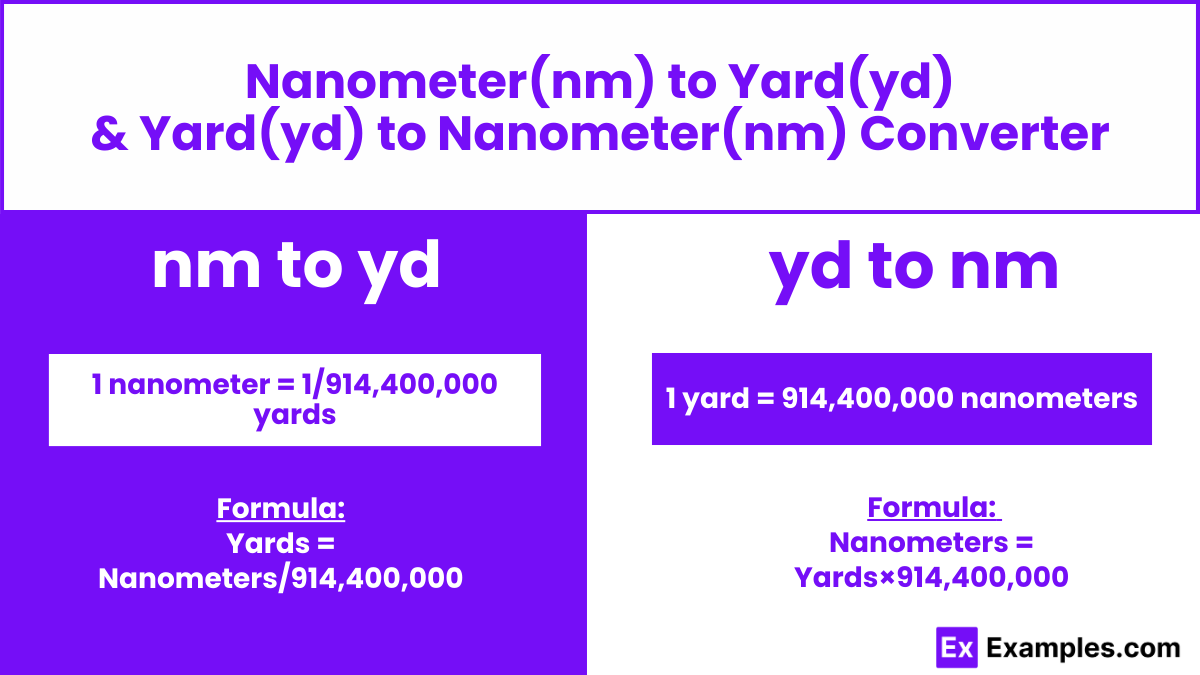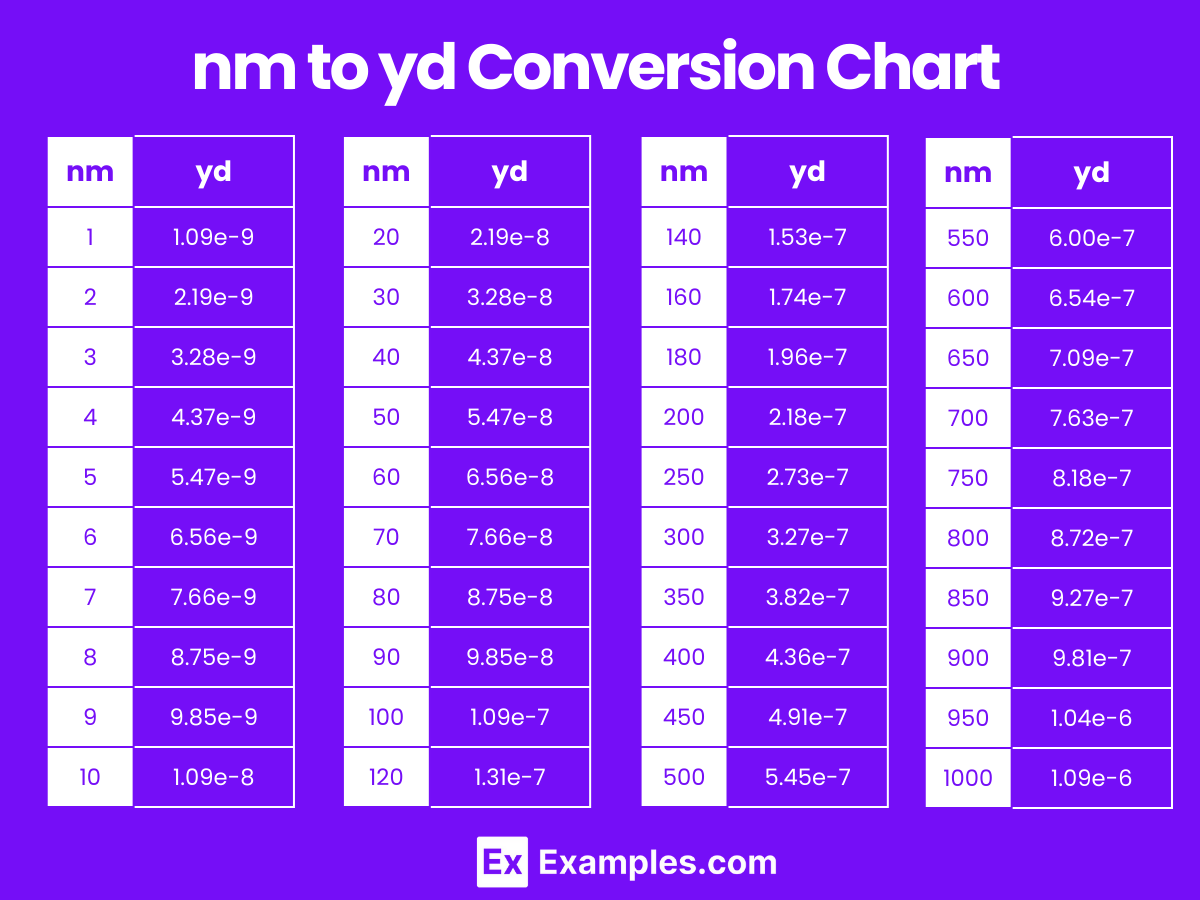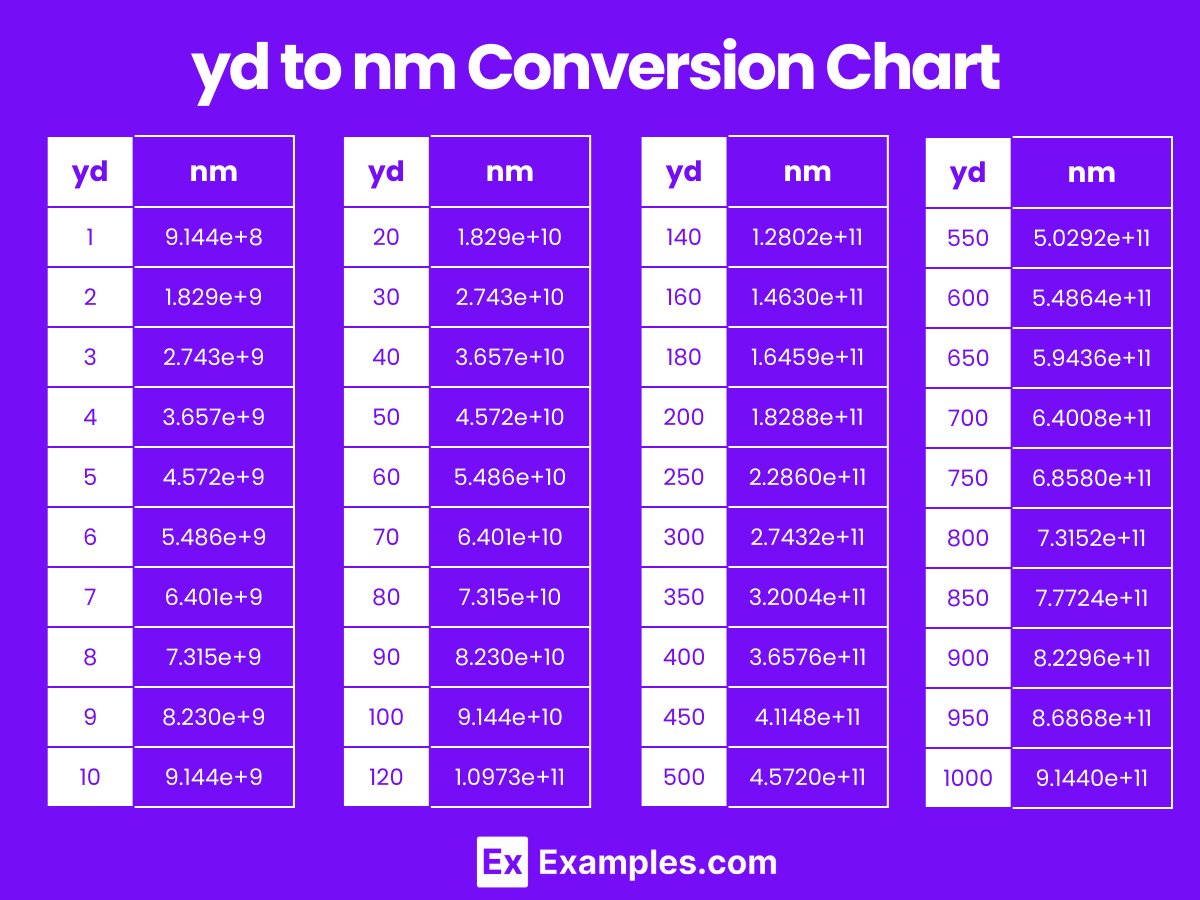Use our accurate Nanometer to Yard and Yard to Nanometer on examples.com for precise unit conversions with ease and efficiency.
nm to yd
Formula: Length in yards (yd) = Length in nanometers (nm) ÷ 914,400,000
Nanometer:
Yard:
| Nanometers | Yards | Exponential Form (yd) |
|---|---|---|
| 1 | 0.00000000109360000000 | 1.0936e-9 |
yd to nm
Formula: Length in nanometers (nm) = Length in yards (yd) × 914,400,000
Yard :
Nanometer :
| Yards | Nanometers |
|---|---|
| 1 | 914400000 |

Length Converters to Nanometer (nm)
| Mile to Nanometer | Feet to Nanometer | Inch to Nanometer |
| Nautical Mile to Nanometer | Kilometer to Nanometer | Centimeter to Nanometer |
| Millimeter to Nanometer | Micrometer to Nanometer |
Length Converters to Yard (yd)
| Kilometer to Yard | Meter to Yard | Centimeter to Yard |
| Millimeter to Yard | Micrometer to Yard | Nanometer to Yard |
| Mile to Yard | Feet to Yard | Inch to Yard |
| Nautical Mile to Yard |
Conversion Factors:
- Nanometers to Yards: 1 yard = 914,400,000 nanometers
- Yards to Nanometers: 1 nanometer = 1/914,400,000 yards
How to Convert Nanometers to Yards:
To convert nanometers to yards, divide the number of nanometers by 914,400,000.
Yards=Nanometers/914,400,000
Example: Convert 2,000,000,000 nanometers to yards.
Yards=2,000,000,000/914,400,000≈2.1872 yards
How to Convert Yards to Nanometers:
To convert yards to nanometers, multiply the number of yards by 914,400,000.
Nanometers=Yards×914,400,000
Example: Convert 3 yards to nanometers.
Nanometers=3×914,400,000=2,743,200,000 nanometers.
Nanometers to Yards Conversion Table
| Nanometers (nm) | Yards (yd) (in exponential form) |
|---|---|
| 1 | 1.09e-9 |
| 2 | 2.19e-9 |
| 3 | 3.28e-9 |
| 4 | 4.37e-9 |
| 5 | 5.47e-9 |
| 6 | 6.56e-9 |
| 7 | 7.66e-9 |
| 8 | 8.75e-9 |
| 9 | 9.85e-9 |
| 10 | 1.09e-8 |
| 20 | 2.19e-8 |
| 30 | 3.28e-8 |
| 40 | 4.37e-8 |
| 50 | 5.47e-8 |
| 60 | 6.56e-8 |
| 70 | 7.66e-8 |
| 80 | 8.75e-8 |
| 90 | 9.85e-8 |
| 100 | 1.09e-7 |
nm to yd Conversion Chart

Yards to Nanometers Conversion Table
| Yards (yd) | Nanometers (nm) |
|---|---|
| 1 | 9.144e+8 |
| 2 | 1.829e+9 |
| 3 | 2.743e+9 |
| 4 | 3.657e+9 |
| 5 | 4.572e+9 |
| 6 | 5.486e+9 |
| 7 | 6.401e+9 |
| 8 | 7.315e+9 |
| 9 | 8.230e+9 |
| 10 | 9.144e+9 |
| 20 | 1.829e+10 |
| 30 | 2.743e+10 |
| 40 | 3.657e+10 |
| 50 | 4.572e+10 |
| 60 | 5.486e+10 |
| 70 | 6.401e+10 |
| 80 | 7.315e+10 |
| 90 | 8.230e+10 |
| 100 | 9.144e+10 |
yd to nm Conversion Chart

Difference Between Nanometers to Yards
| Aspect | Description of Nanometers | Description of Yards |
|---|---|---|
| Definition | A nanometer is one billionth of a meter. It is a unit used in the metric system. | A yard is equal to 3 feet or 36 inches, which is approximately 0.9144 meters. It is a unit used in the imperial system. |
| Scale | Nanometers are used to measure extremely small dimensions, such as atomic structures, wavelengths of light, and dimensions of microchips. | Yards are used to measure larger distances, such as lengths of fields, rooms, or large mechanical parts. |
| Usage | Commonly used in scientific research, particularly in physics, chemistry, and biology. | Widely used in everyday life, especially in countries like the United States and the United Kingdom, for various measurements including textile length and sports field dimensions. |
| Precision | Requires high precision instruments like electron microscopes for measurement due to the microscopic scale. | Measurement does not generally require high precision tools; tape measures or rulers are typically sufficient. |
| Contexts | Relevant in industries such as nanotechnology, semiconductor manufacturing, and material science. | Common in construction, real estate, sports (like football and golf), and public safety for describing distances. |
| Unit Conversion | Conversion to and from other metric units (like meters and micrometers) involves factors of ten, using the base-10 system. | Conversion to and from other imperial units (like feet and inches) often involves multiples of 3 or 12, which can be less straightforward than metric conversions. |
| Visual Representation | Cannot be visualized without specialized equipment; scales are too small to be seen with the naked eye. | Can be easily visualized and measured using common tools like yardsticks and measuring tapes. |
| Examples | Measuring the thickness of a biological membrane or the size of nanoparticles used in drug delivery. | Measuring the length of a swimming pool, the size of a backyard, or the width of a fabric roll. |
1. Solved Examples on Converting Nanometers to Yards
Example 1: Convert 1,000,000,000 nanometers to yards.
Yards=1,000,000,000/914,400,000≈1.0936 yards
Example 2: Convert 500,000,000 nanometers to yards.
Yards=500,000,000/914,400,000≈0.5468 yard
Example 3: Convert 100,000,000 nanometers to yards.
Yards=100,000,000/914,400,000≈0.1094 yards
Example 4: Convert 2,500,000,000 nanometers to yards.
Yards=2,500,000,000/914,400,000≈2.734 yards
Example 5: Convert 50,000,000 nanometers to yards.
Yards=50,000,000/914,400,000≈0.0547 yards.
2. Solved Examples on Converting Yards to Nanometers
Example 1: Convert 1 yard to nanometers.
Nanometers=1×914,400,000=914,400,000 nm
Example 2: Convert 0.5 yards to nanometers.
Nanometers=0.5×914,400,000=457,200,000 nm
Example 3: Convert 3 yards to nanometers.
Nanometers=3×914,400,000=2,743,200,000 nm
Example 4: Convert 0.1 yards to nanometers.
Nanometers=0.1×914,400,000=91,440,000 nm
Example 5: Convert 2 yards to nanometers.
Nanometers=2×914,400,000=1,828,800,000 nm.
1. Why would I need to convert nanometers to yards?
Converting nanometers to yards is useful in fields like material science and engineering where comparisons between microscale objects and larger distances are necessary.
2. How accurate are conversions from nanometers to yards?
Conversions are highly dependent on the accuracy of the initial measurements. Given the large scale difference, small errors in nanometer measurements can significantly impact the converted yard values.
3. How do scientists use the conversion from nanometers to yards?
Scientists might use this conversion when dealing with large-scale projects that require understanding both microscopic and macroscopic phenomena.
4. What are some common mistakes when converting nanometers to yards?
Common mistakes include not accounting for the scale difference properly and simple calculation errors due to handling large numbers.
5. How do you ensure precision when converting nanometers to yards?
Ensuring precision requires using high-quality measuring tools and calculators, and double-checking calculations for errors.
6. How can technology improve the accuracy of conversions from nanometers to yards?
Technology such as digital calculators and conversion software can reduce human error and provide more accurate conversion calculations.

